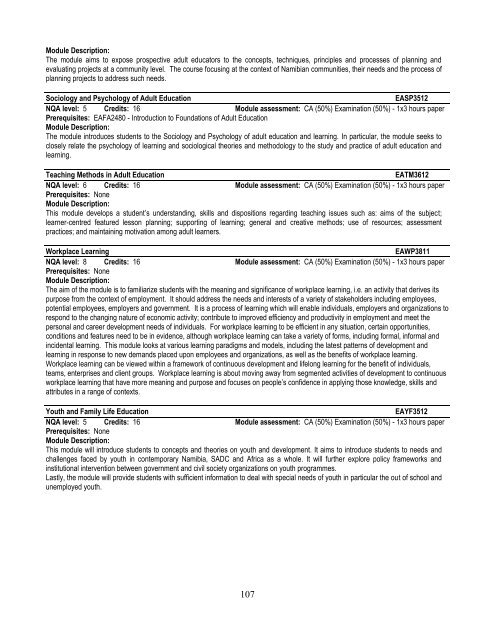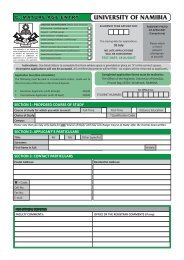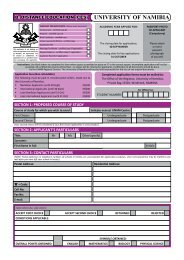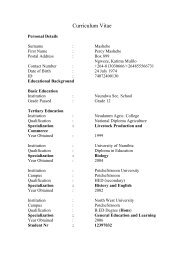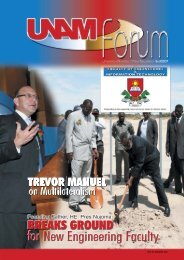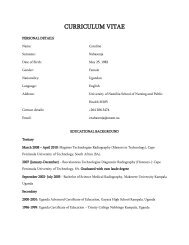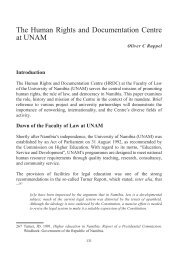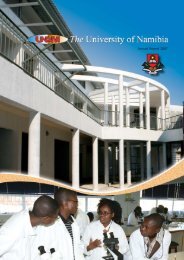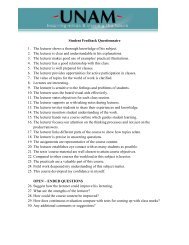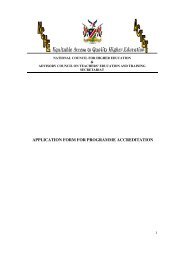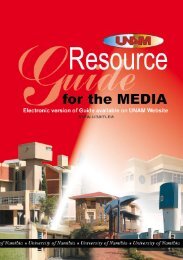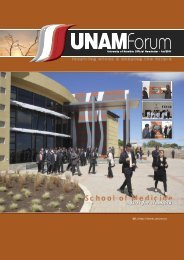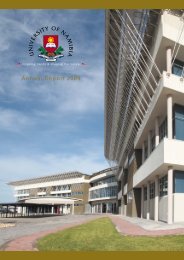UNIVERSITY OF NAMIBIA CENTRE FOR EXTERNAL STUDIES ...
UNIVERSITY OF NAMIBIA CENTRE FOR EXTERNAL STUDIES ...
UNIVERSITY OF NAMIBIA CENTRE FOR EXTERNAL STUDIES ...
Create successful ePaper yourself
Turn your PDF publications into a flip-book with our unique Google optimized e-Paper software.
Module Description:The module aims to expose prospective adult educators to the concepts, techniques, principles and processes of planning andevaluating projects at a community level. The course focusing at the context of Namibian communities, their needs and the process ofplanning projects to address such needs.Sociology and Psychology of Adult EducationEASP3512NQA level: 5 Credits: 16 Module assessment: CA (50%) Examination (50%) - 1x3 hours paperPrerequisites: EAFA2480 - Introduction to Foundations of Adult EducationModule Description:The module introduces students to the Sociology and Psychology of adult education and learning. In particular, the module seeks toclosely relate the psychology of learning and sociological theories and methodology to the study and practice of adult education andlearning.Teaching Methods in Adult EducationEATM3612NQA level: 6 Credits: 16 Module assessment: CA (50%) Examination (50%) - 1x3 hours paperPrerequisites: NoneModule Description:This module develops a student’s understanding, skills and dispositions regarding teaching issues such as: aims of the subject;learner-centred featured lesson planning; supporting of learning; general and creative methods; use of resources; assessmentpractices; and maintaining motivation among adult learners.Workplace LearningEAWP3811NQA level: 8 Credits: 16 Module assessment: CA (50%) Examination (50%) - 1x3 hours paperPrerequisites: NoneModule Description:The aim of the module is to familiarize students with the meaning and significance of workplace learning, i.e. an activity that derives itspurpose from the context of employment. It should address the needs and interests of a variety of stakeholders including employees,potential employees, employers and government. It is a process of learning which will enable individuals, employers and organizations torespond to the changing nature of economic activity; contribute to improved efficiency and productivity in employment and meet thepersonal and career development needs of individuals. For workplace learning to be efficient in any situation, certain opportunities,conditions and features need to be in evidence, although workplace learning can take a variety of forms, including formal, informal andincidental learning. This module looks at various learning paradigms and models, including the latest patterns of development andlearning in response to new demands placed upon employees and organizations, as well as the benefits of workplace learning.Workplace learning can be viewed within a framework of continuous development and lifelong learning for the benefit of individuals,teams, enterprises and client groups. Workplace learning is about moving away from segmented activities of development to continuousworkplace learning that have more meaning and purpose and focuses on people’s confidence in applying those knowledge, skills andattributes in a range of contexts.Youth and Family Life EducationEAYF3512NQA level: 5 Credits: 16 Module assessment: CA (50%) Examination (50%) - 1x3 hours paperPrerequisites: NoneModule Description:This module will introduce students to concepts and theories on youth and development. It aims to introduce students to needs andchallenges faced by youth in contemporary Namibia, SADC and Africa as a whole. It will further explore policy frameworks andinstitutional intervention between government and civil society organizations on youth programmes.Lastly, the module will provide students with sufficient information to deal with special needs of youth in particular the out of school andunemployed youth.107


